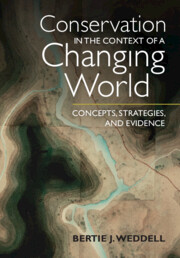Book contents
- Conservation in the Context of a Changing World
- Conservation in the Context of a Changing World
- Copyright page
- Dedication
- Contents
- Preface
- Acknowledgments
- Introduction
- Part I Maintaining Populations of Featured Species: A Utilitarian Approach to Conservation
- Part II Protecting and Restoring Populations and Habitats: A Preservationist Approach to Conservation
- 5 Historical Context
- 6 Central Concepts
- 7 Strategies
- 8 Strategies
- Part III Promoting Biocultural Diversity and Resilience: A Stewardship Approach to Conservation
- Postscript
- Appendix: Types of Ecosystems
- Bibliography
- Index
6 - Central Concepts
Evolution, Adaptation, and Extinction
from Part II - Protecting and Restoring Populations and Habitats: A Preservationist Approach to Conservation
Published online by Cambridge University Press: 28 September 2023
- Conservation in the Context of a Changing World
- Conservation in the Context of a Changing World
- Copyright page
- Dedication
- Contents
- Preface
- Acknowledgments
- Introduction
- Part I Maintaining Populations of Featured Species: A Utilitarian Approach to Conservation
- Part II Protecting and Restoring Populations and Habitats: A Preservationist Approach to Conservation
- 5 Historical Context
- 6 Central Concepts
- 7 Strategies
- 8 Strategies
- Part III Promoting Biocultural Diversity and Resilience: A Stewardship Approach to Conservation
- Postscript
- Appendix: Types of Ecosystems
- Bibliography
- Index
Summary
Darwin and Wallace proposed that natural selection is the process responsible for the evolution of adaptive features. Mutations provide the raw material of evolution. Interacting species influence each other’s evolution through coevolution. Evolution offers insight into many past and current controversies including Proximate (extrinsic) and ultimate (intrinsic) factors influence species’ vulnerability to extinction. Going through a bottleneck results in low genetic diversity and the high risk of becoming extinct due to inbreeding, catastrophes, and fluctuations in birth and death rates and the sex ratio. The theory of island biogeography states that extinction risk is high in small, isolated populations. Understanding evolution has practical implications for managing the evolution of resistance to pesticides, problems from hybridization, and populations at risk of extinction.
Keywords
- Type
- Chapter
- Information
- Conservation in the Context of a Changing WorldConcepts, Strategies, and Evidence, pp. 141 - 172Publisher: Cambridge University PressPrint publication year: 2023



